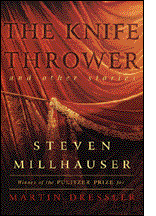
 |
|
SF Reviews and Articles in General Publications Summer ReadingThe May 31st New York Times Book Review lists selected titles from those reviewed since December, including the following SF titles (presumably selected by regular NYTBR SF reviewer Gerald Jonas): Dennis Danvers, Circuit of Heaven (Avon Eos)The much longer fiction list includes several other titles of genre interest: Steven Millhauser's The Knife Thrower and other stories, Ronald Wright's A Scientific Romance, and Gore Vidal's The Smithsonian Institution. Salon Magazine's ''Beach Reading 1998'' feature also repeats recommendations of previously-reviewed titles, including Laura Miller's plug for Jonathan Lethem's Girl in Landscape.
Washington Post Book World, Sunday June 14th, review by A. S. Byatt : ''...the best, and strangest, of his curious and tantalizing new stories are dreamy tales of altered consciousnesses -- a child on a flying carpet, a balloon navigator in the Franco-Prussian War...''. Conclusion: ''It would be possible to relate these backward-looking tales to the anticipation of our stepping, as whole communities, into virtual worlds much as we step into rooms with magic windows in the corners, flickering images of everything and everywhere at us, appealing to our desire to consume. But he is also doing what all good art does: explaining art itself, how it works and how it works on us, how much and why and in what riddling ways we need it.'' Salon, Friday June 5th, review by D. T. Max: ''His surpassing genius is his ability to involve us in worlds that don't exist but that are nonetheless real.'' Entertainment Weekly, May 15th, review by Margot Mifflin: ''Although Milhauser's weakness for enumeration waterlogs a few tales, the sheer volume and intricacy of his imagination is wonderful to behold.'' The New York Times Book Review, Sunday May 10th, review by Patrick McGrath: ''Millhauser has a rich, sly sense of humor, and the tone of whimsy in much of his work conceals disturbing subversive energies. The mind, in Millhauser, is by no means restricted to flights of wonder. It is an edgy place where all manner of weirdness can be unearthed.''Sunday, 14 June 1998  The New York Times Book Review
The New York Times Book ReviewJosh Rubins reviews Kris Rusch's Hitler's Angel. He worries the book might belong to a tradition of ''unwholesome exploitation'' -- since, among other reasons, the author ''has previously worked primarily in the science fiction and fantasy genres'' -- but finds happily that ''blunt sensationalism is not her style''. In the end, though, he finds the book ''too conventional to escape the historical shadows''; a ''careful reconstruction [that] spins out of control, a small-scale fiction overmatched by some of history's most appalling facts.'' Also noteworthy: Simon Singh's review of Sylvia Nasar's A Beautiful Mind, the biography of John Nash, a genius mathematician who laid the foundations of game theory (e.g., the Prisoner's Dilemma) -- then went mad in later life. Sunday, 31 May 1998 Washington Post Book World Gregory Feeley, guest columnist, covers Thomas M. Disch's nonfiction The Dreams Our Stuff Is Made Of. Feeley agrees with Disch's basic thesis that ''our culture is deeply tinged by science fiction'' but wishes Disch had explored this impact on high culture, rock and roll, etc., more than he does. Feeley finds the book's organization ''a bit rudimentary'' but says ''Disch's true artfulness lies less in his logical structure than in his style, which is witty, urbane and generous (with an occasional outburst of biliousness).'' Also covered: Karen Joy Fowler's collection Black Glass, noting the way the publisher disguises the fact that many of the stories were first published in SF magazines. The title story is ''one of those marvels that defeat criticism''. Gwyneth Jones' Phoenix Cafe is pleasureful but not a significant addition to its two predecessors White Queen and North Wind, which ''seem to me among the finest sf novels published in the 1990s''. And Gardner Dozois' latest Year's Best anthology is ''exemplary, if rarely surprising''. Sunday, 24 May 1998 The New York Times Book Review A Books in Brief notice of Mary Doria Russell's Children of God by Jim Gladstone: ''at once more ambitious and somewhat less satisfying than its predecessor.'' Gerald Jonas' Science Fiction column covers four books. He finds Jonathan Lethem's Girl in Landscape ''strained'' but grants ''there is much to admire''. Scott Mackay's Outpost ''avoids the grandiosity that is an occupational hazard of science fiction writers who dabble in cosmic themes. The solution to the mystery of the prison is as implausible as it is provocative.'' Eric S. Nylund's Signal to Noise: ''Unfortunately, Nylund seems to have borrowed his narrative strategy from the slash-and-burn video games that mesmerize adolescent boys.'' And Paul J. McAuley's Child of the River: ''Why McAuley, a fine stylist in his own right, has chosen to pay so slavish a homage to [Gene] Wolfe is not clear'' yet ''I look forward to seeing how he and Yama fare in the next volume of this series.'' 23 May 1998 New Scientist The British weekly science magazine has David Barrett survey the titles on this year's Arthur C. Clarke Award short list. Moving past books by Jeff Noon, James Lovegrove, Elizabeth Hand, and Sheri S. Tepper, Barrett calls Stephen Baxter's Titan the ''politically safe choice this year'' but ultimately prefers -- presciently, as it turned out -- Mary Doria Russell's The Sparrow: ''This is one of the most beautiful and awe-inspiring novels of the decade.'' Thursday, 30 April 1998 The New York Times Christopher Lehmann-Haupt provides the first look at Thomas M. Disch's The Dreams Our Stuff Is Made Of. He finds Disch's thesis hard to pin down; but ''Fortunately, his book presents a number of provocative points, so long as you don't try to connect the dots.'' |
||||||
| TOP |
| © 1998 by Locus Publications. All rights reserved. |
 Millhauser
Millhauser